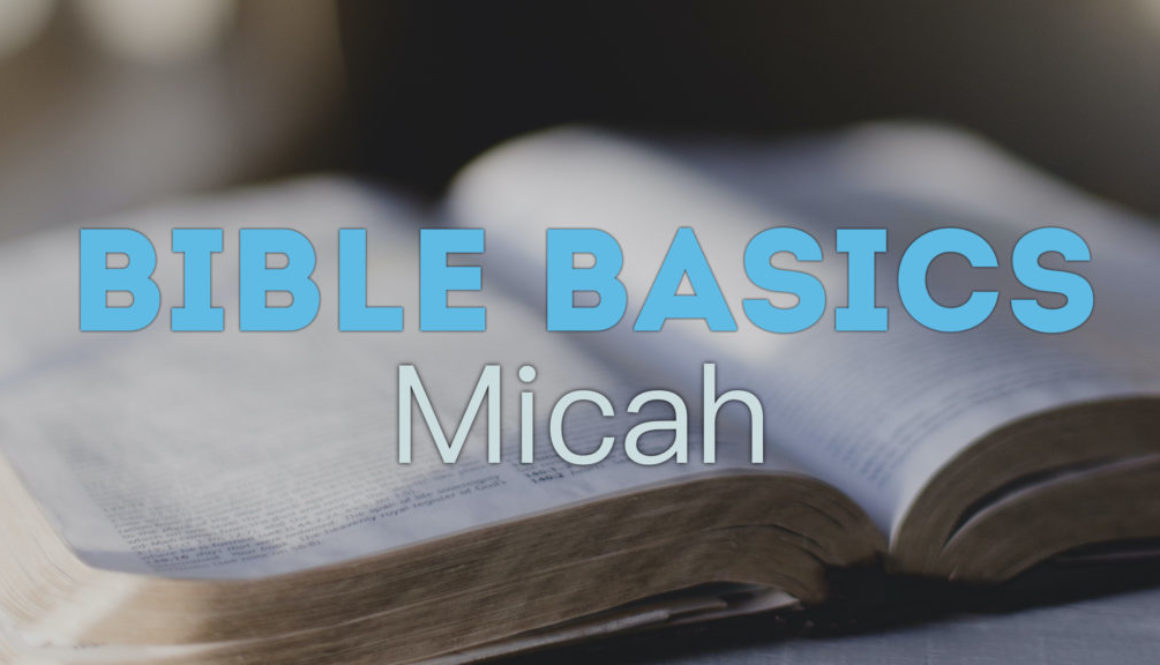Micah
Author
The book was written by Micah, who’s name means “Who is like Jehovah?” Micah came from a small town about twenty miles southwest of Jerusalem, called Moresheth (likely Moresheth-gath or “possession of Gath). Though not from the city itself, there was a major highway from Egypt to Jerusalem which ran through this area, so Micah would have been caught up on all current events in the capitol during a prosperous time in Judah’s history.
Date
The book was written during the reigns of three of Judah’s kings: Jotham, Ahaz and Hezekiah, who collectively ruled from 750 to 687B.C. Micah was a contemporary of Hosea and Isaiah and his prophecies were likely published prior to the fall of Israel to the Assyrians in 722B.C.
Audience and Purpose
Micah was writing primarily to the southern kingdom of Judah, although his prophecies also involve the kingdom of Israel and her capitol city, Samaria, declaring both God’s impending judgement and a hope for future restoration.
Major Themes
- Sin and Judgement
- Sovereignty of God
- Justice. One of Micah’s biggest themes is the oppression of the poor in the nation.
- God’s Promise of Salvation and Restoration.
Key Scriptures
- Micah 3:8 — “But as for me, I am filled with power, with the Spirit of the Lord, and with justice and might, to declare to Jacob his transgression and to Israel his sin.”
- Micah 7:7 — “But as for me, I will look to the LORD; I will wait for the God of my salvation; my God will hear me.”
- Micah 7:18 — “Who is a God like you, pardoning iniquity and passing over transgression for the remnant of his inheritance? He does not retain his anger forever, because he delights in steadfast love.”
Outline
- Micah 1:1-2:13 — Prophesy of God’s Judgment on Israel (Samaria) and Judah
- Micah 3:1-5:15 — Promise of Restoration Following Judgement
- Micah 6:1-7:20 — Charges Against Israel and Hope for Restoration
Gospel Summary
Micah’s prophetic judgements against God’s people were primarily concern how the wealthy were oppressing the poor and God’s call for justice. It was a prosperous time in the nation’s history, yet the rich were oppressing the poor, in order to make themselves richer (see Micah 2:1-2). There was a major lack of love and justice in the nation.
As with most of the Old Testament prophets, Micah declares that the nation will be punished for their ongoing sin and refusal to repent despite God’s graciousness to them. He also delivers a message of restoration and hope in a coming deliverer. Micah makes many messianic prophecies, including the specific one that the Messiah would be born in the little town of Bethlehem, yet His greatness would extend to the ends of the earth (Micah 5:2-5).
If you’re enjoying the content I produce, a little caffeine to keep me going would be appreciated!
© Anthony Scott Ingram 2021. All Rights Reserved.
Photo by Carolyn V on Unsplash
Unless otherwise indicated, all Scripture quotations are from The Holy Bible, English Standard Version®, copyright © 2001 by Crossway Bibles, a publishing ministry of Good News Publishers. Used by permission. All rights reserved.”
Please note that I do get a small kickback from Amazon for any purchases made using the links on this post. Should you choose to purchase from them, I just want to say thank you for further supporting my work in ministry!
